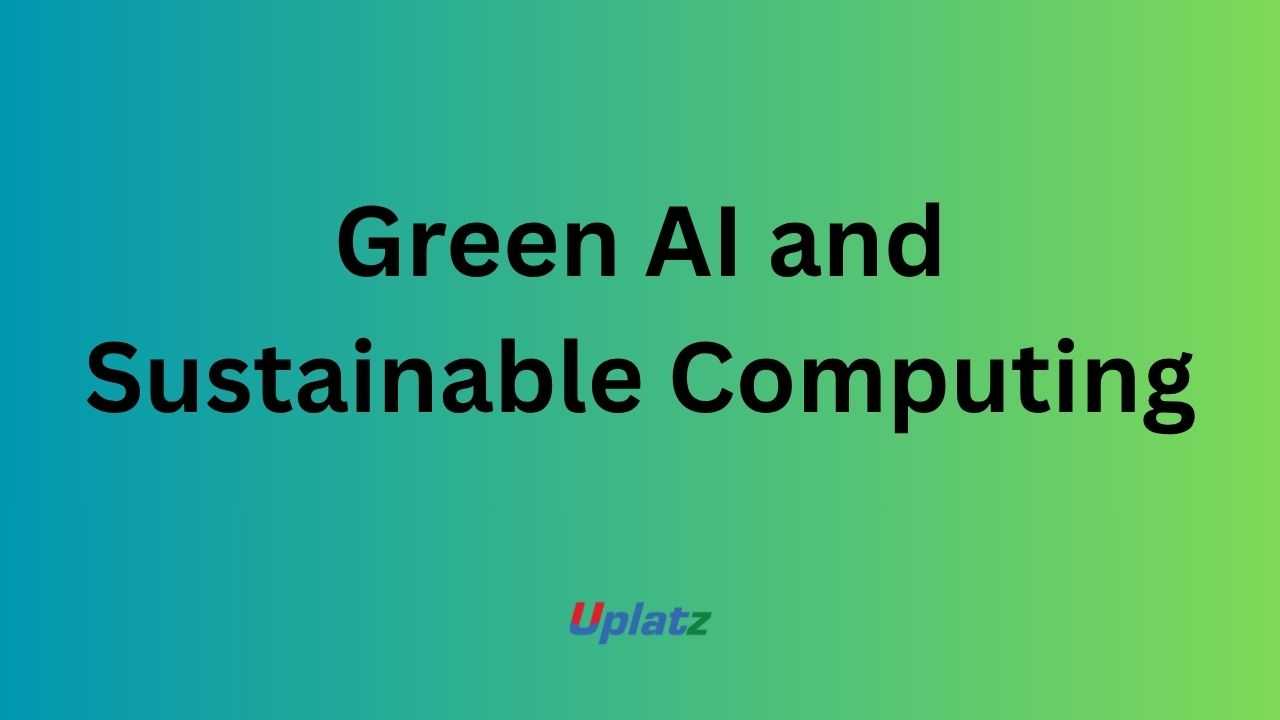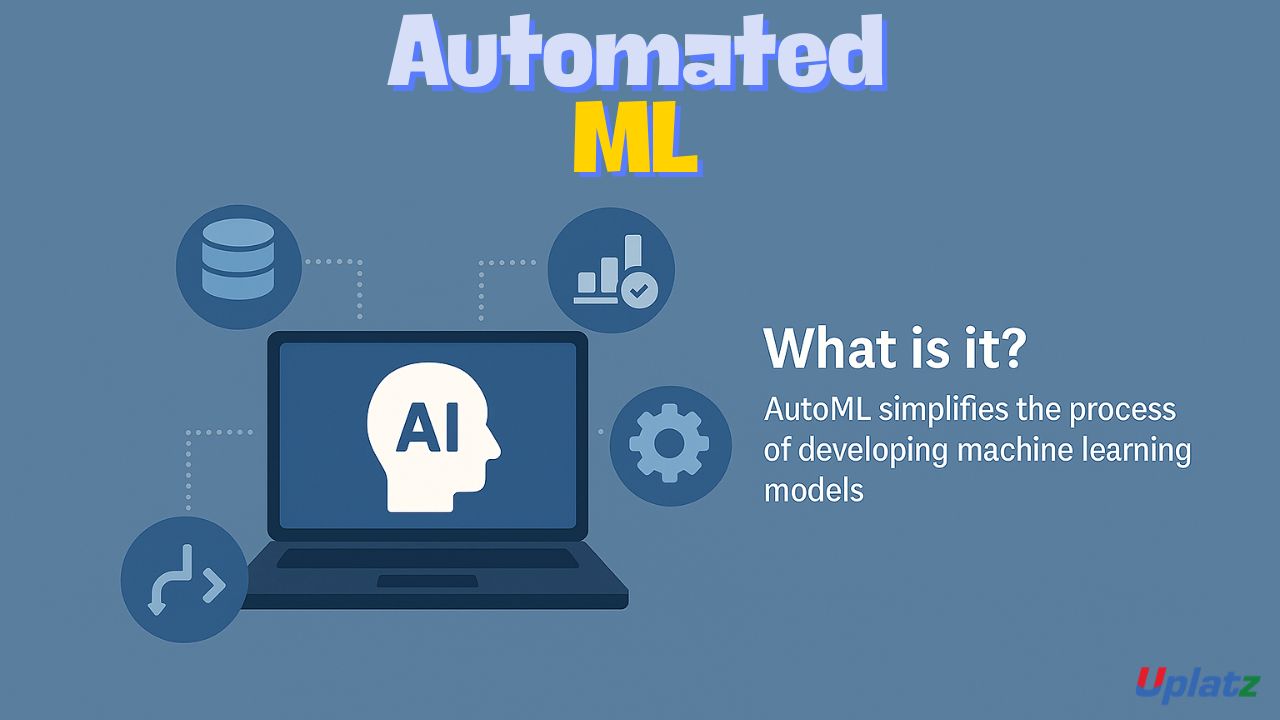Green AI and Sustainable Computing
Build Environmentally Responsible AI Systems That Balance Innovation and Energy Efficiency Price Match Guarantee
Full Lifetime Access
Access on any Device
Technical Support
Secure Checkout
Course Completion Certificate
Price Match Guarantee
Full Lifetime Access
Access on any Device
Technical Support
Secure Checkout
Course Completion Certificate
 97% Started a new career
BUY THIS COURSE (
97% Started a new career
BUY THIS COURSE (GBP 12 GBP 29 )-
 86% Got a pay increase and promotion
86% Got a pay increase and promotion
Students also bought -
-

- Automated Machine Learning (AutoML)
- 10 Hours
- GBP 12
- 10 Learners
-

- Federated Learning
- 10 Hours
- GBP 12
- 10 Learners
-

- Zero Trust Security
- 10 Hours
- GBP 12
- 10 Learners

Green AI and Sustainable Computing are emerging as essential pillars of responsible technological innovation. As artificial intelligence models grow larger and require increasing computational resources, the environmental and energy costs of training and deploying these systems have become a global concern. Tech companies, governments, research labs, and cloud providers are now shifting toward energy-efficient algorithms, carbon-aware computing, transparent reporting, and sustainable infrastructure management.
The Green AI & Sustainable Computing course by Uplatz provides a comprehensive, practical exploration of how to design, train, deploy, and manage AI systems that minimise environmental impact. You will learn how to balance model accuracy with efficiency, how to measure carbon emissions of machine learning workloads, how to optimise hardware utilisation, and how modern cloud platforms are building carbon-aware intelligence into their services.
With a blend of theory and hands-on tools — including Google Carbon-Aware Scheduler, Azure Sustainability APIs, low-power AI frameworks, energy-profiling libraries, and efficient ML architectures — this course equips you to create AI solutions that are powerful, ethical, and sustainable.
🔍 What Is Green AI?
Green AI refers to the design and development of machine learning systems that reduce energy consumption, carbon emissions, and environmental footprint across their entire lifecycle. While traditional “Red AI” focuses purely on maximizing accuracy and model performance (often at enormous computational cost), Green AI aims to achieve responsible AI excellence by optimising:
-
Energy usage
-
Compute requirements
-
Memory footprint
-
Training cost
-
Hardware utilisation
-
Carbon emissions
-
Environmental impact
Green AI encompasses algorithmic efficiency, sustainable hardware choices, eco-friendly cloud deployment, efficient data processing practices, and transparency in reporting energy and carbon metrics.
This course teaches the complete ecosystem around sustainable AI — including algorithms, systems, infrastructure, cloud platforms, and ethical considerations.
⚙️ How Green AI Works
Designing sustainable AI involves optimising every stage of the ML lifecycle:
1. Data Efficiency
Reducing data redundancy, using smaller datasets effectively, and leveraging data pruning and smarter sampling methods.
2. Model Efficiency
Using:
-
Sparse models
-
Distillation
-
Quantisation
-
Efficient network architectures (MobileNet, EfficientNet, TinyML)
-
Low-precision computation and pruning techniques
3. Energy-Optimised Training
Measure and reduce energy consumption using:
-
Carbon-tracking libraries (CodeCarbon)
-
Energy profilers
-
Power-aware schedulers
4. Sustainable Hardware
Leveraging:
-
Low-power GPUs and TPUs
-
Accelerator-aware scheduling
-
ARM, RISC-V, and edge computing hardware
-
High-efficiency cooling systems
5. Carbon-Aware Cloud Deployment
Using green cloud strategies such as:
-
Google Cloud carbon-intelligent regions
-
Azure Sustainability APIs for energy usage tracking
-
AWS carbon reporting tools
-
Geographic load shifting
6. Responsible Model Management
Including:
-
Lifecycle planning
-
Efficient inference and deployment
-
Model compression
-
End-of-life decommissioning best practices
You will learn to build AI systems that maintain performance while using minimal energy and leave a lighter carbon footprint.
🏭 How Green AI Is Used in the Industry
Green AI is increasingly adopted across industries striving to lower energy usage and meet sustainability goals.
1. Tech & Cloud Companies
Google, Microsoft, Amazon, Meta, and IBM are building carbon-aware AI services and sustainability dashboards for data centres.
2. Finance & Banking
Energy-efficient ML for fraud detection, algorithmic trading, and risk modelling reduces operational costs and carbon impact.
3. Telecommunications
Low-power AI models in edge and 5G networks support smart devices, IoT, and telecom optimisation without excessive energy use.
4. Healthcare
AI-assisted diagnostics and medical imaging systems are optimised for energy-efficient inference on edge devices.
5. Manufacturing & Industry 4.0
Sustainable computing powers robotics, smart factories, predictive maintenance, and automation systems that run on constrained hardware.
6. Smart Cities & Transportation
AI models for traffic prediction, mobility systems, and resource management are deployed efficiently at the edge.
7. Environmental Science
Green AI supports climate modelling, biodiversity monitoring, and satellite image processing with reduced compute needs.
Organisations across sectors are prioritising Green AI to comply with sustainability goals, reduce operational costs, and minimise environmental impact.
🌟 Benefits of Learning Green AI & Sustainable Computing
Learning Green AI positions you at the forefront of responsible tech innovation. Benefits include:
-
Industry-relevant skills aligned with global sustainability goals.
-
Practical experience in carbon tracking, energy profiling, and green cloud deployments.
-
Ability to optimise ML models for speed, cost, and environmental footprint.
-
Career opportunities in green tech, cloud computing, AI research, and corporate sustainability.
-
Knowledge of carbon-aware tools like Google CAS, Azure sustainability APIs, and low-power AI frameworks.
-
Cross-disciplinary expertise across AI engineering, systems optimisation, and sustainable computing strategies.
-
Future-proof skills in an emerging area gaining rapid attention across industries.
This course helps you become a responsible AI practitioner who can design eco-friendly tech systems without sacrificing performance.
📘 What You’ll Learn in This Course
(This is the landing-page overview; the detailed syllabus appears in its own tab.)
You will explore:
-
AI energy consumption & environmental impact
-
Lifecycle sustainability: data → training → deployment → retirement
-
Efficient ML algorithms & low-carbon optimisation
-
Model compression, distillation, and quantisation
-
Edge AI & low-power hardware design
-
Sustainable cloud computing
-
Carbon-aware schedulers & energy-tracking tools
-
Ethical AI principles & transparency
-
Case studies of eco-efficient AI in industry
-
Capstone: build a carbon-aware AI model or pipeline
🧠 How to Use This Course Effectively
To get the most value from this course:
-
Begin with basics: energy use, compute cost, environmental metrics.
-
Understand the full lifecycle of ML systems.
-
Learn to measure power usage and carbon emissions using real tools.
-
Practice optimising model architecture and training routines.
-
Explore edge AI and efficient inference.
-
Use cloud sustainability APIs to deploy carbon-aware workloads.
-
Build your capstone: an end-to-end, low-carbon AI pipeline.
-
Review advanced modules on optimisation and lifecycle management.
👩💻 Who Should Take This Course
Perfect for:
-
Machine Learning Engineers
-
AI & Deep Learning Researchers
-
Cloud Architects & DevOps Engineers
-
Data Scientists
-
Green Tech & Sustainability Professionals
-
Environmental Informatics Teams
-
Students entering AI, cloud, or climate-tech domains
-
Anyone interested in responsible and eco-friendly computing
Basic Python and ML knowledge is helpful but not mandatory.
🚀 Final Takeaway
Green AI is reshaping the future of artificial intelligence — pushing developers to build models that are powerful yet energy-efficient, accurate yet carbon-aware, innovative yet sustainable.
The Uplatz Green AI & Sustainable Computing course gives you the tools to design responsible AI systems that minimise environmental harm while meeting modern performance requirements. By the end of this course, you will be able to create AI workflows that align with global climate goals, corporate sustainability strategies, and ethical AI frameworks.
-
Understand the concept of Green AI and its importance.
-
Learn how energy consumption impacts AI model training.
-
Apply energy-efficient algorithms and model compression techniques.
-
Use cloud-based sustainability tools and APIs.
-
Analyse and reduce carbon footprints of AI workflows.
-
Explore hardware-level sustainability in GPUs, TPUs, and edge devices.
-
Design lightweight, low-power neural networks.
-
Implement monitoring for energy and carbon metrics.
-
Align AI projects with global sustainability goals (SDGs, ESG).
-
Prepare for leadership roles in sustainable AI and ethical computing.
Course Syllabus
Module 1: Introduction to Green AI and Sustainable Computing
Module 2: Environmental Impact of AI and Data Centres
Module 3: Algorithmic Efficiency and Model Compression
Module 4: Energy-Aware Hardware – GPUs, TPUs, and Edge Devices
Module 5: Sustainable Data Practices and Cloud Management
Module 6: Carbon-Aware Scheduling and Workload Optimisation
Module 7: Green AI Frameworks – TensorFlow Lite, ONNX, PyTorch Mobile
Module 8: ESG, SDG, and Ethical AI Governance
Module 9: Case Studies – Climate Tech, Smart Grids, and Energy AI
Module 10: Capstone Project – Build a Carbon-Aware AI Model
Upon successful completion, learners receive a Certificate of Completion from Uplatz, validating their expertise in Green AI and Sustainable Computing. This Uplatz certification demonstrates your ability to design, evaluate, and implement energy-efficient AI systems that adhere to sustainability principles.
The certification aligns with global goals such as the UN Sustainable Development Goals (SDGs) and corporate ESG frameworks, making it highly relevant for professionals in AI engineering, sustainability strategy, and ethical technology innovation.
Holding this certificate establishes your commitment to responsible innovation — ensuring that your AI projects contribute positively to both society and the planet.
Sustainability has become a top priority across all technology sectors. Completing this course from Uplatz prepares you for impactful roles such as:
-
Sustainable AI Engineer
-
Green Computing Specialist
-
AI Ethics and Sustainability Consultant
-
Cloud Sustainability Architect
-
Data Centre Efficiency Analyst
Professionals in this domain typically earn between $100,000 and $185,000 per year, with roles available in tech companies, climate tech startups, research institutions, and ESG-focused consultancies.
This course equips you to lead the transition toward energy-efficient, transparent, and carbon-aware AI systems, contributing to global sustainability and ethical innovation.
-
What is Green AI?
It’s an approach to AI that prioritises efficiency, transparency, and reduced environmental impact. -
How does AI impact the environment?
Through large-scale energy use in training and running ML models, leading to carbon emissions. -
What is model compression?
Techniques like pruning and quantisation that reduce model size and energy use. -
What are examples of Green AI frameworks?
TensorFlow Lite, PyTorch Mobile, and ONNX Runtime. -
What is carbon-aware scheduling?
Allocating workloads based on real-time grid carbon intensity to lower emissions. -
How can data centres become more sustainable?
By using renewable energy, efficient cooling, and smart workload management. -
What are SDGs and ESGs in AI?
Frameworks promoting sustainability, ethics, and governance in technology development. -
How can AI help fight climate change?
By optimising energy use, predicting environmental risks, and managing renewable systems. -
What are major challenges in sustainable computing?
Balancing accuracy with energy efficiency and tracking emissions transparently. -
What is the future of Green AI?
AI systems will be designed with carbon budgets, efficiency metrics, and environmental accountability.









